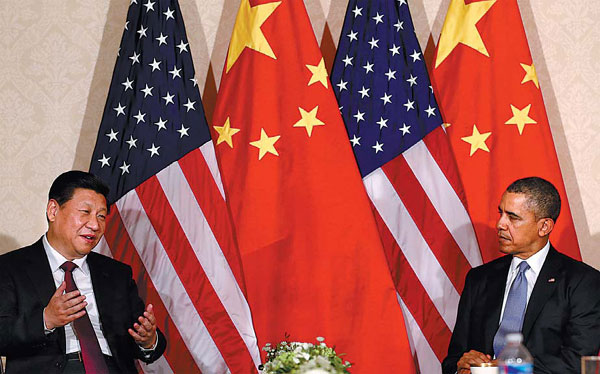Xi's tenet of comprehensive governance
Updated: 2015-08-05 07:32
By Robert Lawrence Kuhn(China Daily)
|
||||||||
 |
|
Chinese President Xi Jinping meets with his US counterpart Barack Obama on the sidelines of the Nuclear Security Summit in The Hague on March 24, 2014. [Photo/Agencies] |
President Xi Jinping will pay a state visit to Washington at a time when most China watchers in the United States have become pessimistic about Sino-US relations. While the optimum strategy for both sides is to focus on issues that unite us - economic growth, climate change, green tech, regional wars, terrorism, organized crime, pandemics - US policymakers should also understand what is really going on in China.
The general perception among US-based China experts is that, in terms of political reform and civil society, China is regressing.
These are multifaceted issues and there is misunderstanding, but this is precisely why anyone concerned with China should be familiar with Xi's "Four Comprehensives", his overarching political theory. Foreigners often dismiss the political aphorisms of China's leaders as simplistic sloganeering, but I know how important they are. I've had private conversations and conducted public interviews (for Closer To China on CCTV News) - and here is what I've found.
Xi put forth his "Four Comprehensives" to explain the four most critical categories for making the Chinese Dream, his grand vision, a reality: Comprehensively build a moderately prosperous society; comprehensively deepen reform; comprehensively govern the nation according to law; and comprehensively strictly govern the Party.
Each of the "Four Comprehensives" has its own nature. "Moderately prosperous" is a goal. "Deepen reform" is a means. "Rule of law" is a principle. Strict discipline of the Party is an action or state of affairs. But each has been a major policy in itself for years: "moderately prosperous society" since 2002; "reform" since 1978; "rule of law" since at least 1997; "discipline of the Party" (in a sense) since the Party was founded in 1921. So what is Xi's purpose of combining the four now?
The "Four Comprehensives" emerge as Xi's political philosophy of governance via two linguistic devices and two pragmatic purposes. The linguistic devices are (i) combining the four policies into a single idea, and (ii) using the same word, "comprehensive", as a descriptor of each. Combining them makes the point that these four are the basic drivers and, if achieved, all the others to realize the Chinese Dream would follow. "Comprehensive" signals two notions: (i) each policy is facing critical challenges in the "new era" of the "new norm", such that each must be expanded beyond its prior formulation, and (ii) Xi is making a very public commitment to each policy, such that there is now no turning back.
The pragmatic purposes are (i) a candid compilation of experiences and assessment of current conditions and (ii) a priority to implement and act in order to achieve the unifying goal for 2020 - realizing the "moderately prosperous society". As only five years remain, the "Four Comprehensives" highlight the deep-rooted obstacles that must be overcome and the need for a clarifying call to action to achieve the Chinese Dream (first goal).
How does "comprehensively" enrich the long-standing goal of a "moderately prosperous society"? For example, farmers, Xi told the Political Bureau of the CPC Central Committee, must participate as equals in the process of reform and development so they too can enjoy its fruits.
"Deepen reform" is the "driving force" of Xi's governance. The message to officials is "focus on action; have a clear plan; know your numbers".
"Rule of law" is perhaps the most misunderstood. Recent judicial reforms are a milestone: The power to control the court system - from financing the judiciary to selecting judges - is being transferred from the local level to the provincial level. The objective is to prevent local interference in the fair and equitable adjudication of cases and administration of justice.
"Strict discipline of the Party" stresses Xi's relentless determination to root out corruption and to shrink the wasteful and detested perks of officialdom.
Xi's governance and "Four Comprehensives" work complementarily and recursively - the Four Comprehensives shaping governance and governance empowering the Four Comprehensives. For the new era, Xi is challenging China to improve its governance, which must be systemic as well as systematic.
China wants the world to understand Xi's governance. That's good for China, good for the world. US policymakers should take note.
The author is a political/economics commentator.
- Global health entering new era: WHO chief
- Brazil's planning minister steps aside after recordings revelation
- Vietnam, US adopt joint statement on advancing comprehensive partnership
- European border closures 'inhumane': UN refugee agency
- Japan's foreign minister calls A-bombings extremely regrettable
- Fukushima impact unprecedented for oceans: US expert

 Stars of Lijiang River: Elderly brothers with white beards
Stars of Lijiang River: Elderly brothers with white beards
 Wealthy Chinese children paying money to learn British manners
Wealthy Chinese children paying money to learn British manners
 Military-style wedding: Fighter jets, grooms in dashing uniforms
Military-style wedding: Fighter jets, grooms in dashing uniforms
 Striking photos around the world: May 16 - May 22
Striking photos around the world: May 16 - May 22
 Robots help elderly in nursing home in east China
Robots help elderly in nursing home in east China
 Hanging in the air: Chongqing holds rescue drill
Hanging in the air: Chongqing holds rescue drill
 2.1-ton tofu finishes in two hours in central China
2.1-ton tofu finishes in two hours in central China
 Six things you may not know about Grain Buds
Six things you may not know about Grain Buds
Most Viewed
Editor's Picks

|

|

|

|

|

|
Today's Top News
Liang avoids jail in shooting death
China's finance minister addresses ratings downgrade
Duke alumni visit Chinese Embassy
Marriott unlikely to top Anbang offer for Starwood: Observers
Chinese biopharma debuts on Nasdaq
What ends Jeb Bush's White House hopes
Investigation for Nicolas's campaign
Will US-ASEAN meeting be good for region?
US Weekly

|

|







